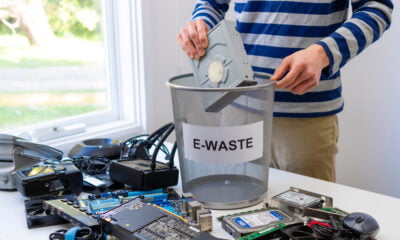

Environment
A Fifth Of Brits Have Ditched A Working PC For A New Model
In the last five years, a fifth (21%) of Brits have thrown away at least one operational computer and replaced it with a newer model, this is according to new research from Crucial, the memory and storage experts.
Based on UK population figures from the ONS, this means that more than 13.872 million computers have been binned in the last five years by Brits. More than two in five (45%) of those that binned their PCs did so because it had slowed down, a third (32%) said it took too long to turn on and 29% said that their computer kept freezing.
The survey of 2,000 people, conducted by Crucial, found that more than a third of Brits (36%) threw away their PC because they wanted a more powerful, newer model. Just 18% gave their old computer to someone else, 14% recycled it and only 6% gave their system an upgrade with new internal components.
One of the leading contributors to landfill waste in the UK is E-Waste, created by disused or discarded technology including household appliances like old PCs.
Jeremy Mortenson, Crucial Memory Product Line Manager, commented:
“One of the leading contributors to landfill waste in the UK is E-Waste, created by disused or discarded technology including household appliances like old PCs. Our research shows that people are ditching working systems because they’ve slowed down, take too long to turn on and freeze all the time, all of which can be easily fixed. Brits are choosing to spend excessive amount on purchasing new computers when they could be getting a brand new machine for as little as £40 with a simple upgrade that doesn’t require any technical skills.”
One in five Brits (21%) have unused working computers sitting at home, which could be upgraded to give them a new lease of life. On average, Brits have owned two computers in the last five years and are seemingly replacing their PCs much more regularly than business users. According to leading IT managers, the average business computer lasts 3 to 4 years before being disposed of3.
Jonathan Weech, Crucial Solid-State Drive (SSD) Product Line Manager, added:
“The rapid evolution of technology makes it easy to believe that if your computer isn’t new, it’s old. The research suggests that UK consumers are buying new systems more regularly than businesses, whose PCs will be used daily and more intensively. It’s not clear why this is the case, but one factor could be that consumers are using sub-£500 computers that lack internal memory and fast storage. These computers tend to come with between 4-8GB of memory and slow mechanical hard drives, when you could install 16GB yourself to improve as well as install an SSD to improve performance and extend your PCs life.”
He continues:
“This perception of new and old encourages people to settle for expensive fixes like a new computer. Few people realise that a memory upgrade will increase the responsiveness of their system and how fast applications and programmes run, whilst an SSD will make slow computers start up and load applications almost instantly. The cost of upgrading can be as much as 10 times less expensive that buying a new computer, so consumers are missing a trick by opting for an expensive replacement instead of a simple, cheap upgrade.”
Massive changes don’t need to happen to improve your computer, and a memory and SSD upgrade deliver small, sustainable changes that deliver immediate and lasting results. Memory is easy to install and increases system performance and responsiveness, whilst SSDs are 6 times faster than a typical hard drive. When looking to upgrade, Crucial.com has a free advisor tool and computer scanner that are guaranteed to find the right product to fix your computer in 60 seconds or less.
































